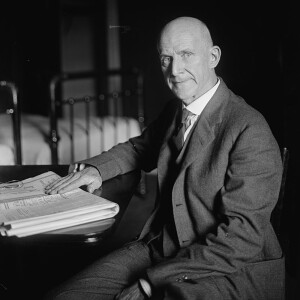
There's nothing unskilled about manual work, even stuff you don't think about - cleaning and digging holes, for example, require real skill and knowledge. Debs takes apart the myth of the 'unskilled' worker.
We use the term “common laborer” in no derogatory sense. There are a vast number of workingmen who are without trades: termed, not always rightfully, “unskilled” laborers. Their importance in carrying forward the great industrial enterprises of the world has not been recognized in the past, and is not appreciated now. In this fact lies the germ of discontent and danger. This magazine is the organ of a body of workingmen, of whom it has been said, they are not “skilled laborers,” and that they do not become such until they are promoted to the position of engineers. Manifestly, this is an error. No one at all capable of giving an opinion in the matter hesitates to say that it requires skill to properly fire a locomotive. The term “skill” is often used in a sense which does great injustice to men who do not wear the badge of some particular trade, and hence, the term “skilled laborer” is never applied to men who are known as “common laborers.”
The Firemen’s Magazine is watchful of the interests of the great body of men who are members of the Brotherhood of Locomotive Firemen. It observes with profound interest the movements of all labor organizations, because in such movements if professes to behold the redemption of labor from oppression and degradation. We make no apology for asserting that the welfare of the country centers in the one fact of doing absolute justice in all matters relating to fair wages for work, by which we mean such wages as shall make the home of the American workingman exempt from the ceaseless peril of mendicancy.
The American idea is to obtain such wages for work as will make the American home comfortable, where there shall be an abundance of food, decent clothing, apartments for rest and recreation — not shanties — not tenement houses, fit only for beasts and bats — fit dwellings, fit places for American children to be born and reared, and when the wages are sufficient to secure such needs the American idea is to maintain them, and when wages fall below securing such requirements the American idea is to organize for the purpose of obtaining them. It is clear, therefore, that the American idea is the betterment of the American workingman regardless of trade. In saying this, we state the whole case.
The American workingman is an American citizen. He has the same sovereign rights and prerogatives as any other citizen. If he can secure sufficient wages, he will be in a position to appreciate his privileges and dignity, his sovereignty. If circumstances are created which deny him such wages, which compel him to live like a pagan, like a degraded Hungarian, Italian, or Pole, who have no more conception of American citizenship than savages, those who create them and profit by them are not only enemies of workingmen, but are enemies of their government, and if their purposes cannot be thwarted, they will ultimately inaugurate revolution.
We have said the hopes of the country center in the emancipation of the workingmen from conditions which compel them to accept such wages as keep them forever on the ragged edge of mendicancy, bring them in close contact with famine, make life a ceaseless burden and horror.
The organization of men of the same trade or calling has a cheering significance. It means resistance to wrong; it makes federation to secure and to maintain the right. It means fair wages, but those organizations leave out the common laborer, that vast army of workingmen who work and whose work is necessary to enable the skilled laborer to work and without whose work every industrial enterprise in all lands would cease.
Do we overestimate the importance of the common laborer? They perform the initial work in all enterprises. We need not particularize. No intelligent reader will be at a loss for illustration. We do not care where the reader begins. It may be the statue of Michelangelo, the painting of Raphael or St. Peters, from foundation to dome; it may be the most delicate piece of mechanism seen in the Paris Exposition or the ponderous engine, whose mighty arms set in motion the wheels and spindles and lathes of the mills; all, all, everywhere, from the deep solemnity of the mine to the cap stone of monuments; cottage, palace, steepled church, domed capitols and cathedrals, the steamship and the steam-car, the bridge, the tunnel, the canal, the steel highways, the telegraph, the telephone, the fruitful fields, where the bearded wheat and tasselled corn nod in the breeze, tell of the work and importance of the common laborer.
Well, what is the world doing for the common laborer? Who will answer? He has been left out in the cold. He does not organize. We have had, and we hope still to have, words of appreciation for the organization known as the Knights of Labor. We glory in its growth. We deprecate anything that hinders its advancement. The Knights of Labor organization takes in the common laborer. In doing this, it meets a requirement of incalculable importance and is deserving of the highest commendation.
In the organization of the Knights of Labor the common or the unskilled laborer finds a home, a retreat where he can do that for himself which the skilled laborer does for himself in his organization. If the labor organization confers benefits, and none doubt the fact who know anything of their operations, why should not the common laborer, the unskilled workingman, participate in such blessings? Why should not the home of the common laborer be made bright and beautiful? Why should not the wife and children of the common laborer be surrounded with the comforts of life? No good reason why such should not be the case ever was furnished, nor will it ever be supplied. And the Knights of Labor, comprehending the importance of having such men organized, take them in, and incalculable good is to result from the movement.
The labor organization is in many regards a school, an educating, elevating force; and the fact that the common laborer is to enjoy the advantages of such an organization is well calculated to inspire hopefulness in the future for the common laborer of the country. The work in which the Knights of Labor are engaged is a noble one, and all friends of the toiling masses will rejoice to see the organization achieve success.
More Episodes
 2024-01-18
2024-01-18
 2024-01-17
2024-01-17
 2024-01-16
2024-01-16
 2024-01-15
2024-01-15
 2024-01-12
2024-01-12
 2024-01-11
2024-01-11
 2024-01-10
2024-01-10
 2024-01-09
2024-01-09
 2024-01-05
2024-01-05
Create your
podcast in
minutes
- Full-featured podcast site
- Unlimited storage and bandwidth
- Comprehensive podcast stats
- Distribute to Apple Podcasts, Spotify, and more
- Make money with your podcast
It is Free
- Privacy Policy
- Cookie Policy
- Terms of Use
- Consent Preferences
- Copyright © 2015-2024 Podbean.com






